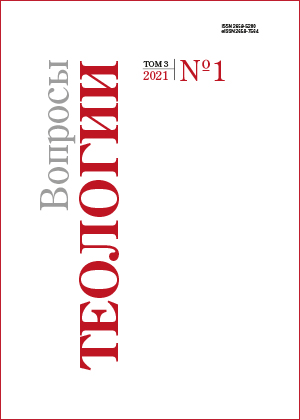Interrelation between anthropology and psychology in the works of St. Theophan the Recluse
DOI:
https://doi.org/10.21638/spbu28.2021.103Аннотация
The works of bishop Theophan (Govorov) the Recluse on Christian ethics are considered fundamental in studying the history of the formation of Christian psychology in Russia. The style, narrative and vocabulary of the works echo his Russian edition of the “Philokalia”. However, contrary to the common perception that Saint Theophan the Recluse thought exclusively in the language of Holy Fathers, the present study provides examples showing that the saint borrowed some ideas from the classical German philosophy of romanticism. Under the influence of his teachers from the Kiev Theological Academy (P.A.Avsenev), he addresses the subject of the “human spirit”. Arguing with representatives of natural philosophy, whose names he does not mention, Theophan asserts that the spirit is the highest faculty of human nature, the breath of life, the image of God, which enables man to communicate with the Creator. For St. Theophan, as for many other academic scholars of the mid-19th century, “moral philosophy”, “anthropology” and “psychology” were interchangeable concepts. As shown in this study, in matters of psychology and pedagogy, the reflections of Theophan the Recluse are based on the same model that was actively developed by the philosophers of modern times (Schelling, Hegel). Despite serious worldview differences in relation to religion, Saint Theophan reads, filters and continues to develop some ideas that originated in German philosophy.
Ключевые слова:
anthropology, psychology, person, personality, Russian theology, St.Theophan the Rescue, upbringing, vow of baprism
Скачивания
Библиографические ссылки
References
Загрузки
Опубликован
Выпуск
Раздел
Лицензия
Статьи журнала «Вопросы теологии» находятся в открытом доступе и распространяются в соответствии с условиями Лицензионного Договора с Санкт-Петербургским государственным университетом, который бесплатно предоставляет авторам неограниченное распространение и самостоятельное архивирование.




